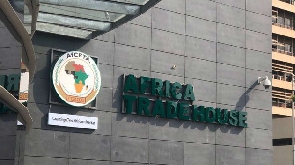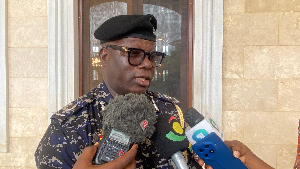The Secretariat of the African Continental Free Trade Area (AfCFTA), has recognized Ghana as a shining example in the implementation of the continent’s free trade agreement.
“We started with seven countries, and I am happy Ghana is taking the lead in this process of implementing the AfCFTA agreement,” said, Mr Didier Bonyeme, Division Head, Rules of Origin, AfCFTA Secretariat.
Mr Bonyeme said this at a GIZ/CUTS International public-private dialogue on the Guided Trade Initiative (GTI) – a pilot implementation of the AfCFTA agreement, in Accra.
Ghana is one of the eight countries that have satisfied the requirements to participate in the GTI out of the 29 that have submitted their tariff offers and host to the AfCFTA Secretariat, which has the largest global free trade area by number of member states.
Some 14 Ghanaian companies, assisted by the government, have so far, engaged in 40 trades with neighbouring African countries under the GTI.
The Guided Trade Initiative is a pilot implementation phase, aimed at ensuring an acceleration in the operationalization of AfCFTA, by testing the institutional, legal, and trade policy environment for the free trade agreement.
Speaking with the Ghana News Agency, Mr Bonyeme explained that compared with other African countries equally implementing AfFCTA, the Government of Ghana had done more to facilitate private sector participation.
He noted that through the National Coordination Office, the Government had created opportunities for partnerships between Ghanaian companies and their African counterparts, leading to increased trade under AfCFTA.
Dr Diana Ogwal Akullo, Principal Officer, Sanitary and Phyto-Sanitary (SPS), AfCFTA Secretariat, also said: “The Ghana government has been exemplary in the implementation of GTI under AfCFTA.”
Mr Isaac Kwame Ansah, Head of Operations, G-mith Enterprise, a natural deodorant manufacturing company that trades under AfCFTA, said the Ghana Export Promotion Authority (GEPA) had been assisting many SMEs in the direction.
He said through GEPA’s trade house, they were able to keep their products in other African countries when they went to trade shows and were able to sell all their products.
“We don’t go through any customs challenges in shipping our goods, it’s just a phone call or mail.” Mr Ansah said.
He said trading under AfCFTA had helped take a lot of burden off their shoulders, stating that the removal of tariffs had enabled their company to export freely to other countries.
Mr Fechin Akoto, Assistant Commissioner, Tariff and Trade, Customs Division, Ghana Revenue Authority (GRA), explained that before the start of AfCFTA, the country had put in place measures to facilitate trade.
Mr Appiah Kusi Adomako, West Africa Regional Director, CUTS International, said Ghana’s participation in the implementation of AfCFTA signified a strong political will and an encouragement to countries, yet to submit their tariff concessions to do so.
Stakeholders called on the AfCFTA Secretariat to enhance working with governments across the continent to resolve challenges of transport and certification to boost trade.
Business News of Tuesday, 5 December 2023
Source: GNA













